Disclosure: We may earn commissions if you purchase products after clicking on a link from our site.
When hunting alligators, imagine yourself silently gliding through the murky waters of the bayou, eyes peeled for the telltale ripple of their scaly backs. But how can you guarantee a successful hunt? Understanding the behavior and habitats of these apex predators is just the beginning. Stay tuned to uncover the key strategies and techniques that will give you the upper hand in this thrilling pursuit.

Table of Contents
- 1 Key Takeaways
- 2 Understanding Alligators
- 3 Regulations and Licensing
- 4 Preparing for the Hunt
- 5 Equipment for Hunting Alligators
- 6 Hunting Techniques
- 7 Prime Hunting Locations
- 8 Alligator Hunting Tips
- 9 After the Harvest
- 10 Processing, Preserving, and Cooking
- 11 Safety Considerations
- 12 How to Hunt Alligators for Beginners
- 13 How to Hunt Aligators on Public Land
- 14 How to Hunt Alligators on Private Land
- 15 How Do Alligators Hunt Their Prey?
- 16 The Bottom Line
Key Takeaways
- Obtain a hunting license and necessary permits.
- Follow quotas, tag harvested alligators, and report promptly.
- Scout alligator habitats near water sources.
- Use appropriate gear like boats, firearms, and spotlights.
- Employ techniques like Spot and Stalk, Baiting, and Dog tracking.

Understanding Alligators
You need to understand the biology and behavior of alligators before you begin hunting them. Knowing how these reptiles function in their environment will give you an advantage in successfully tracking and capturing them. Familiarize yourself with their habits and instincts to guarantee a safe and effective hunting experience.
Biology and Behavior
You know that to understand alligators, you must first grasp their diet, habitat, and behavior. Their diet includes fish, birds, and mammals, making them formidable predators.
Alligators thrive in freshwater habitats like swamps and marshes, exhibiting fascinating behaviors such as bellowing to communicate and building nests for their eggs.
Diet
Alligators primarily feed on a diet consisting of fish, turtles, birds, and small mammals in their natural habitat. This diverse diet provides them with the necessary nutrients to thrive. Below is a breakdown of the typical diet of alligators:
| Food Group | Examples |
|---|---|
| Fish | Catfish, Gar |
| Turtles | Snapping Turtle |
| Birds | Herons, Ducks |
Habitat
In their natural environment, alligators typically inhabit freshwater habitats such as swamps, marshes, and rivers. These habitats offer the perfect conditions for alligators to thrive, providing ample food sources and suitable nesting grounds.
Alligators are well-adapted to these environments, using their keen sense of smell and powerful bodies to navigate through the murky waters in search of prey. Understanding their habitat is essential when preparing to hunt these formidable creatures.
Behavior
Exploring the behavior of alligators reveals fascinating insights into how these creatures navigate their freshwater habitats with precision and adaptability.
- Territorial: Alligators fiercely guard their territories, displaying dominance over other alligators.
- Nocturnal: These reptiles are primarily active during the night, hunting and feeding under the cover of darkness.
- Social Interaction: Alligators exhibit complex social behaviors, including communication through vocalizations and body language.
- Maternal Care: Female alligators fiercely protect their young, providing maternal care post-hatching.

Regulations and Licensing
You need to be aware of the legal requirements and permits necessary when hunting alligators. Understanding the regulations and licensing process is essential to ensuring you’re compliant with the law. Make sure to obtain the proper permits before engaging in any alligator hunting activities.
Legal Requirements
You need to make sure you have the proper hunting license before you start alligator hunting. Additionally, it’s important to be aware of the designated hunting season, quotas, and the requirement for tags.
Understanding and following these regulations and licensing requirements are essential to engage in legal alligator hunting practices.
Hunting License
One must obtain a hunting license before engaging in alligator hunting to comply with legal requirements. To guarantee you’re properly licensed, follow these steps:
- Contact your state’s wildlife agency for specific licensing information.
- Complete any required hunter education courses.
- Purchase the appropriate alligator hunting permit.
- Adhere to all regulations regarding license display while hunting.
Season
Before heading out to hunt alligators, make sure you are aware of the specific season regulations and licensing requirements in your area to avoid any legal issues.
| Licensing Requirements | Season Regulations | Legal Limitations |
|---|---|---|
| Hunting License | Dates | Size Restrictions |
| Training Certification | Time of Day | Harvest Quotas |
| Tags | Geographic Limits | Reporting Rules |
Quotas and Tags
To comply with legal requirements when hunting alligators, hunters must adhere to specific quotas and tag regulations set by the authorities in their area.
Make sure to follow these guidelines:
- Obtain the necessary permits and licenses.
- Respect the designated quotas for alligator hunting.
- Tag all harvested alligators correctly.
- Report your harvest to the relevant authorities promptly.
Permits
Understanding the regulations and licensing requirements for alligator hunting is essential before undertaking this adventurous pursuit. To legally hunt alligators, you must obtain a permit from the relevant wildlife agency in your state. These permits are typically limited in number and may be allocated through a lottery system due to high demand.
It’s important to familiarize yourself with the specific regulations governing alligator hunting in your area, including season dates, size restrictions, and any applicable fees. Additionally, hunters are often required to complete a state-approved training course to make sure they understand all safety protocols and ethical hunting practices.
When applying for a permit, be sure to do so well in advance, as the process may take time, and deadlines can vary. Keep in mind that violating permit regulations can result in hefty fines or even criminal charges.
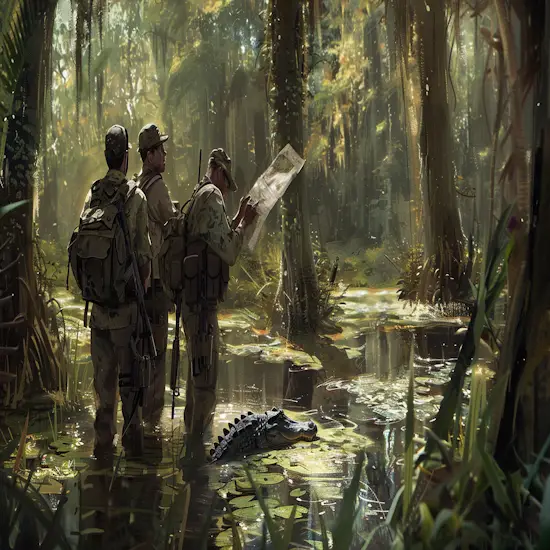
Preparing for the Hunt
Before starting on your alligator hunting adventure, you must prioritize scouting the area, guaranteeing you have the right gear and guides, and undergoing necessary training.
Scouting helps you familiarize yourself with the environment, gear and guides ensure a safe and successful hunt, while proper training prepares you for the challenges ahead.
Scouting
When preparing for the alligator hunt, your first step should be to scout the area for potential hunting spots. Here are some key tips to keep in mind during the scouting process:
- Research: Look into the types of habitats alligators prefer, such as marshes, swamps, or lakes. This will help you narrow down the areas to focus on.
- Signs of Alligator Activity: Keep an eye out for signs like tracks, slides, and nests. These indicators can lead you to areas where alligators are likely to be found.
- Water Sources: Alligators are often near water, so scout for bodies of water such as rivers, ponds, or canals. Alligators may use these water sources for hunting and resting.
- Safety Considerations: Make sure you’re aware of the potential risks in the area, such as other wildlife or difficult terrain. Safety should always be a top priority during scouting and the hunt itself.
Gear and Guides
Make sure you have the necessary gear and knowledgeable guides lined up ahead of your alligator hunt to increase your chances of a successful and safe experience. When it comes to gear, a sturdy boat or airboat is essential for traversing the waters where alligators reside.
Make sure you have a reliable firearm or bow for the hunt, along with appropriate ammunition or arrows. Additionally, a strong spotlight or headlamp is vital for spotting alligators at night when they’re most active. Don’t forget to equip yourself with protective gear such as waders, gloves, and eye protection to guarantee your safety during the hunt.
In terms of guides, it’s highly recommended to hire experienced professionals who are familiar with alligator hunting techniques and the local terrain. These guides can provide valuable insights, increase your chances of success, and help ensure that the hunt is conducted ethically and legally. They can also assist in handling the captured alligator safely and efficiently.
Training
Preparing for the alligator hunt involves sharpening your shooting skills and physical endurance to guarantee a successful and safe experience. To make sure you’re well-prepared for the hunt, follow these key training steps:
- Firearm Proficiency: Practice shooting accurately and quickly, focusing on precision to secure a humane and effective kill shot.
- Physical Conditioning: Enhance your endurance and strength through cardio and strength training exercises to handle the physical demands of tracking and capturing alligators.
- Alligator Behavior Study: Learn about alligator habits, movements, and preferred habitats to anticipate their actions and improve your hunting strategy.
- Mock Drills: Simulate hunting scenarios with your team to enhance coordination, communication, and response time during the actual hunt.

Equipment for Hunting Alligators
Now, let’s talk about the gear you’ll need for hunting alligators. Essential items like a powerful rifle and a sharp knife are vital for a successful hunt.
Additionally, safety gear such as sturdy boots and protective eyewear will help keep you safe in the unpredictable swamps.
Essential Gear
You’ll need specific gear for hunting alligators, like harpoons, bang sticks, snatch hooks, bows, crossbows, firearms, and spotlights. These tools are essential for capturing and immobilizing alligators safely and effectively. Make sure you’re well-equipped before heading out into the wild.
Harpoons and Bang Sticks
When hunting alligators, having harpoons and bang sticks is essential for quick and effective dispatching of the prey. These tools are vital for a successful alligator hunting experience:
- Harpoons: Used for accurate long-range penetration.
- Bang Sticks: Provide a close-range, powerful shot to immobilize the alligator.
- Safety: Always prioritize your safety and that of others when using these tools.
- Training: Proper training in handling harpoons and bang sticks is indispensable.
Snatch Hooks
For successful alligator hunting, incorporating snatch hooks into your gear is essential to effectively capturing and securing the prey.
Snatch hooks are sturdy, sharp tools designed to latch onto the alligator’s tough skin, allowing you to reel it in once hooked.
These hooks provide a reliable method to restrain the alligator, making it easier to approach and dispatch the animal swiftly and safely.
Bows and Crossbows
In alligator hunting, equipping yourself with bows and crossbows is essential for effectively taking down your target.
- Accuracy: Bows and crossbows offer precise aiming, important for hitting an alligator’s essential spots.
- Stealth: These weapons allow for silent shots, preventing the alligator from being alerted.
- Power: Crossbows provide the necessary force to penetrate an alligator’s tough hide.
- Reloading: Bows and crossbows can be quickly reloaded, ensuring rapid follow-up shots.
Firearms
Equip yourself with firearms when hunting alligators to enhance your effectiveness in taking down these formidable creatures. Firearms like rifles or shotguns provide the necessary power and accuracy to guarantee a successful hunt. Remember to use appropriate ammunition for the size of the alligator you are targeting.
| Firearm Type | Advantages |
|---|---|
| Rifle | Long-range accuracy |
| Shotgun | Spread shot for close encounters |
Spotlights
Enhance your visibility during alligator hunting expeditions by utilizing powerful spotlights to illuminate your surroundings effectively.
- Brightness: Opt for spotlights with high lumens for maximum visibility.
- Longevity: Choose spotlights with durable batteries to last throughout the hunt.
- Beam Distance: Select spotlights with long beam distances to spot alligators from afar.
- Waterproof: Guarantee your spotlight is waterproof to withstand the wet hunting environment.
Hand-held Catch Poles
When hunting alligators, having a dependable hand-held catch pole is essential for safely capturing and handling these powerful reptiles.
These poles are designed with sturdy materials and a secure locking mechanism to guarantee a firm grip on the alligator’s neck or body.
Pre-charged Pneumatic Airbows
A reliable tool for hunting alligators is the pre-charged pneumatic airbow, ensuring accuracy and power when targeting these formidable reptiles. Equipped with advanced features, the airbow provides hunters with the precision and force necessary for a successful hunt.
- Precision: Allows for accurate targeting of specific areas.
- Power: Generates sufficient force to penetrate alligator hides.
- Ease of Use: Simple operation for efficient hunting.
- Reliability: Consistent performance in various conditions.
Gigs
To effectively hunt alligators, one indispensable piece of gear you’ll need is a gig, a specialized tool designed for capturing these reptiles.
Gigs consist of a long pole with a sharp, barbed tip that helps secure the alligator once it’s been speared. This tool allows hunters to maintain a safe distance while being effective in capturing the prey. Gigs are vital for successful alligator hunting expeditions.
Spears
One key tool that complements gigs in hunting alligators is the spear, which provides hunters with additional reach and precision in capturing these reptiles. Spears are essential for successful alligator hunting due to their versatility and effectiveness.
Here are some key points about spears:
- Extend your reach.
- Improve precision in striking.
- Allow for safer distances.
- Enhance the overall hunting experience.
Spearguns
When hunting alligators, spearguns are essential tools that provide hunters with increased accuracy and power for capturing these formidable reptiles.
These specialized weapons allow you to deliver precise shots from a distance, helping you immobilize the alligator swiftly and safely.
Spearguns come in various sizes and designs, offering versatility in different hunting environments. Proper training and familiarity with your speargun are vital for a successful alligator hunt.
Safety Gear
Now, let’s talk about the essential safety gear you need for hunting alligators. Make sure to pack a life jacket to stay afloat in case of emergencies. Additionally, carry a first aid kit and protective gloves to handle any unexpected situations with caution.
Life Jacket
Make sure you have a properly fitted life jacket before setting out on any alligator hunting expedition.
- Check Fit: Guarantee the life jacket fits snugly without restricting movement.
- Buoyancy: Opt for a jacket with sufficient buoyancy to keep you afloat.
- Visibility: Choose a brightly colored jacket for easy spotting in water.
- Quality: Invest in a high-quality life jacket to ensure durability and reliability.
First Aid Kit
Make sure your alligator hunting safety gear includes a well-stocked first aid kit for immediate medical attention in case of emergencies. Pack essentials like bandages, antiseptic wipes, gauze pads, adhesive tape, tweezers, scissors, and pain relievers.
Be prepared for minor injuries like cuts, scrapes, or insect bites that may occur during your hunting expedition. Prioritize safety by having a thorough first aid kit readily available at all times.
Protective Gloves
Make sure you have protective gloves as an essential part of your alligator hunting safety gear.
When selecting protective gloves, consider the following:
- Opt for puncture-resistant materials to protect against alligator bites.
- Guarantee a secure grip to handle equipment effectively.
- Choose gloves that allow for dexterity to perform tasks with ease.
- Pick a size that fits snugly to prevent slippage during use.
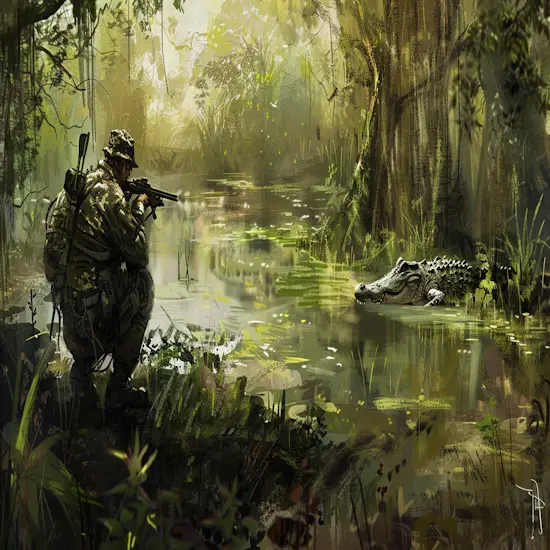
Hunting Techniques
Ready to learn about effective hunting techniques for alligators? You can choose from methods like spot and stalk, baiting, or utilizing dogs to track down these elusive reptiles.
Each technique requires skill, patience, and a deep understanding of alligator behavior in their natural habitat.
Spot and Stalk
When hunting alligators, spotting and stalking are essential techniques. You need to carefully scan the surroundings to spot these elusive creatures. Once you’ve located your target, stealth and patience are key in stalking them for a successful hunt.
Spotting
Spotting alligators while hunting involves keen observation and patience. To improve your spotting skills, remember these key tips:
- Scan the water’s surface for ripples or disturbances.
- Look for the characteristic shape of an alligator’s head and eyes.
- Pay attention to any movement along the shoreline or in the vegetation.
- Use binoculars to enhance your ability to spot alligators from a distance.
Stalking
To successfully stalk alligators while hunting, move quietly and methodically through their habitat, keeping a sharp eye out for any signs of movement or their distinctive features.
Use natural cover to conceal your approach, taking slow, deliberate steps to avoid alerting the alligator. Stay downwind to prevent them from catching your scent.
Baiting
Now let’s talk about baiting alligators. You’ll learn about different bait types and how to strategically place them to attract these reptiles. Understanding baiting techniques is essential for a successful alligator hunting experience.
Bait Tyes
Selecting the appropriate type of bait is essential when hunting alligators as it can greatly influence the success of your expedition.
When choosing bait types, consider the following:
- Chicken: Effective and commonly used.
- Fish: Natural prey for alligators.
- Marshmallows: Surprisingly attractive to alligators.
- Rotten meat: Emits a strong odor that can lure alligators.
Placement
Consider strategically positioning your bait to attract alligators effectively during your hunting expedition. To optimize your hunting success, place the bait in areas with high alligator activity, such as near water sources or along their typical pathways. Remember to keep a safe distance and use proper equipment. Below is a table outlining key bait placement strategies:
| Bait Placement TIps |
|---|
| Near Water Sources |
| Along Pathways |
| Concealed from View |
Use of Dogs
Utilizing trained dogs is a common and effective technique in hunting alligators. These skilled canines play an essential role in locating, restraining, and even deterring alligators during hunts.
Here’s how you can effectively use dogs in your alligator hunting expeditions:
- Scent Tracking: Dogs have a powerful sense of smell, making them adept at tracking alligator scents over various terrains, leading hunters to their targets efficiently.
- Alert System: Dogs can alert hunters to the presence of alligators by barking or displaying specific behaviors, signaling the need for caution and readiness to engage.
- Restraining Assistance: Trained dogs can help restrain alligators by holding them in place, allowing hunters to approach safely and take necessary actions.
- Deterrence: The mere presence of dogs can deter alligators from approaching or attacking hunters, acting as a protective barrier and enhancing overall safety during the hunt.

Prime Hunting Locations
You should consider heading to Florida, Louisiana, Georgia, Texas, or South Carolina for prime alligator hunting opportunities.
These states offer diverse habitats and thriving alligator populations, making them ideal destinations for your hunting expeditions. Each location presents unique challenges and rewards for hunters seeking unforgettable experiences in the wild.
Florida
You’ll find that the Everglades National Park and Lake Okeechobee are prime hunting locations for alligator enthusiasts like yourself.
These areas boast abundant populations of these reptiles, providing ample opportunities for a thrilling hunting experience.
Everglades National Park
For prime alligator hunting locations in Florida, Everglades National Park stands out as a top choice. Here’s why:
- Vast wetlands provide ideal alligator habitats.
- Abundance of water sources attracts alligators.
- Diverse ecosystems offer varied hunting experiences.
- Experienced guides can enhance your hunting expedition in the park.
Lake Okeechobee
One of the prime alligator hunting locations in Florida is Lake Okeechobee. This vast freshwater lake provides ample opportunities for alligator hunting enthusiasts. With its marshy shores and abundant wildlife, Lake Okeechobee offers a thrilling experience for hunters. Be prepared for an exciting adventure as you navigate the waters and search for these impressive reptiles.
| Lake Okeechobee | Facts |
|---|---|
| Location | Southern Florida |
| Size | 730 square miles |
| Wildlife | Alligators, birds |
Louisiana
Now, let’s talk about prime alligator hunting locations in Louisiana. The Atchafalaya Basin and the vast marshlands are popular spots for hunting these reptiles. These areas offer plenty of opportunities for a thrilling hunting experience.
Atchafalaya Basin
Located in Louisiana, the Atchafalaya Basin offers prime hunting locations for those seeking alligator encounters.
- Vast Area: Spanning over 1.4 million acres, it provides ample space for hunting.
- Abundant Wildlife: The basin is home to a diverse range of wildlife, making it a thriving hunting ground.
- Regulated Hunting Season: Be sure to check the hunting season dates to comply with regulations.
- Guided Tours: Consider booking guided tours for a safe and educational hunting experience.
Marshland
The marshland in Louisiana offers pristine hunting locations for alligator enthusiasts. The vast wetlands provide the perfect habitat for these reptiles, making it an ideal spot for hunting expeditions.
These marshes are teeming with alligator activity, presenting exciting opportunities for hunters looking to test their skills.
With its unique ecosystem and abundance of wildlife, Louisiana’s marshland is a top destination for those seeking an unforgettable alligator hunting experience.
Georgia
Head over to Georgia for some prime alligator hunting locations, like the Okenfenokee Swamps and the coastal areas.
These spots offer excellent opportunities to observe and hunt alligators in their natural habitats. Get ready for an adventure in the heart of the Georgia wilderness.
Okenfenokee Swamps
Nestled within Georgia lies the renowned Okenfenokee Swamps, a prime hunting location for alligator enthusiasts.
The diverse ecosystem of the swamps provides ample opportunities for spotting alligators. The dense vegetation and winding waterways offer a challenging yet rewarding hunting experience.
Local guides are available to navigate the intricate water channels and enhance your alligator hunting expedition. Be prepared for close encounters with these fascinating creatures in their natural habitat.
Coastal Areas
With numerous rivers and marshes, Georgia’s coastal areas offer prime hunting locations for alligator enthusiasts. The diverse ecosystems provide ample opportunities to spot these reptiles in their natural habitat.
Be prepared for thrilling encounters as you navigate through the network of waterways and low-lying coastal plains. Keep a sharp eye out for lurking gators in the murky waters, ready to showcase their stealth and power.
Texas
In Texas, the marshlands along the Gulf Coast provide prime hunting locations for alligators. If you’re looking to start on an alligator hunting adventure, Texas offers some of the best spots to track down these formidable reptiles.
Here are some key areas to explore:
- Anahuac National Wildlife Refuge: This expansive refuge is home to a diverse range of wildlife, including alligators. The marshy terrain and abundant water sources make it an ideal hunting ground.
- Jasper and Jefferson Counties: Located in Southeast Texas, these counties boast a mix of marshes, swamps, and rivers, creating a perfect habitat for alligators. Be sure to obtain the necessary permits before hunting in this region.
- Brazoria National Wildlife Refuge: With its intricate network of marshes and wetlands, this refuge offers ample opportunities for alligator hunting. Exercise caution and follow regulations when exploring this challenging terrain.
- Galveston Island: This barrier island along the Texas coast is another hotspot for alligator hunting. The diverse ecosystems present here provide a unique setting for a thrilling hunting experience.
South Carolina
Explore the vast wetlands and rivers of South Carolina for prime alligator hunting locations. South Carolina offers a unique opportunity for alligator hunting due to its diverse ecosystems. The coastal areas, including regions like the Pee Dee River and the Santee River, are known for their abundant alligator populations. These areas provide ideal habitats for alligators, making them fruitful hunting grounds.
When hunting alligators in South Carolina, be sure to obtain the necessary permits and follow all regulations set by the South Carolina Department of Natural Resources. It’s essential to prioritize safety during the hunt and to be well-prepared with the right equipment.
Additionally, consider hiring a local guide who’s familiar with the area and can provide valuable insights into prime hunting spots. Experienced guides can enhance your hunting experience by increasing your chances of success.
Remember to respect the environment and the wildlife while hunting in South Carolina. By exploring the wetlands and rivers of this state, you can start on an exciting alligator hunting adventure in prime locations.
Arkansas
Consider venturing into the prime hunting locations in Arkansas for thrilling alligator hunting opportunities amidst its diverse landscapes. Arkansas offers a unique setting for alligator hunting, with its swamps, rivers, and lakes providing ample habitat for these creatures.
Here are some of the top locations in Arkansas where you can undertake an exciting alligator hunting expedition:
- White River: Known for its abundant wildlife, the White River is a hotspot for alligator hunting in Arkansas.
- Lake Chicot: This picturesque lake offers a serene yet thrilling setting for hunting alligators.
- Bayou Bartholomew: Explore the meandering waters of Bayou Bartholomew for a chance to encounter alligators in their natural habitat.
- Cache River: The Cache River is another must-visit location for alligator hunting enthusiasts, boasting a rich ecosystem teeming with wildlife.
Head to these prime hunting spots in Arkansas for an unforgettable alligator hunting experience amidst the beauty of the Natural State.
Alabama
Venture into Alabama’s diverse landscapes to discover prime hunting locations for exhilarating alligator hunting experiences. The Mobile-Tensaw Delta, a vast swampy area, provides ideal habitat for alligators and offers hunters a challenging environment to test their skills. With its intricate network of waterways and marshes, this region is a hotspot for alligator hunting enthusiasts seeking a thrilling adventure.
Head to Lake Eufaula, known for its abundance of wildlife, including sizable alligator populations. The lake’s marshy areas and coves create perfect hiding spots for these reptiles, making it a promising location for a successful hunt. Be prepared for a pulse-pounding pursuit as you navigate through the labyrinthine water passages in search of your prey.
For a different hunting experience, explore the Mobile Bay area, where alligators roam the wetlands and swamps surrounding the bay. This coastal region offers a unique backdrop for alligator hunting, blending the excitement of the chase with the tranquility of the picturesque landscape. Prepare for an unforgettable alligator hunting expedition in Alabama’s diverse and thrilling terrains.

Alligator Hunting Tips
To increase your chances of a successful hunt, always approach alligators from downwind to avoid detection.
When hunting these formidable reptiles, it’s important to be mindful of your surroundings and follow these essential tips:
- Stay Stealthy: Move quietly and slowly to prevent alerting the alligators to your presence.
- Observe Carefully: Take note of the alligator’s behavior and body language to anticipate its next move.
- Aim for Essential Spots: When taking your shot, target the soft underbelly or behind the eyes for a more humane and efficient kill.
- Safety First: Always prioritize safety by keeping a safe distance, using proper equipment, and being aware of other potential dangers in the area.

After the Harvest
Now that you’ve successfully harvested an alligator, it’s important to remember the significance of the CITES Tag, the Unused CITES Tag, and the Alligator Harvest Report Form.
These documents play a critical role in ensuring proper tracking and reporting of your harvest, so make sure to complete them accurately and promptly.
Adhering to these regulations helps in maintaining a sustainable alligator population and contributes to the conservation effort.
CITES Tag
After harvesting an alligator, you must make sure that the CITES tag is properly attached for documentation purposes.
Here are steps to correctly handle the CITES tag:
- Secure the Tag: Guarantee the CITES tag is securely attached to the harvested alligator.
- Check Information: Verify that all the information on the CITES tag is accurate and matches the required documentation.
- Record Details: Make a record of the CITES tag number and any other relevant information for future reference.
- Compliance: Adhere to all regulations regarding the handling and reporting of the CITES tag to ensure legal compliance.
Properly handling the CITES tag is essential as it serves as documentation that the alligator was harvested legally. Failure to comply with the regulations regarding the CITES tag can result in legal repercussions and penalties.
Unused CITES Tag
Once you have harvested an alligator and find yourself with an unused CITES tag, proper disposal or return procedures must be followed to maintain compliance with regulations. Unused CITES tags are vital documents that need to be dealt with responsibly. Disposing of these tags incorrectly can result in penalties or fines.
If you have an unused tag, you should contact the appropriate wildlife management agency or CITES office to inquire about the specific procedures for returning or disposing of the tag. Some agencies may require you to return the tag to them, while others may have specific disposal instructions.
It is essential to follow the guidelines provided by the authorities to make sure that you aren’t in violation of any regulations. Failure to properly handle unused CITES tags can reflect poorly on your hunting practices and conservation efforts. By taking the necessary steps to return or dispose of the tag correctly, you demonstrate your commitment to ethical hunting and wildlife management.
Alligator Harvest Report Form
Make sure to complete the Alligator Harvest Report Form promptly following your alligator harvest. This form is essential for wildlife management purposes and helps authorities keep track of alligator populations. By providing accurate information on your harvest, you contribute to the conservation efforts and help maintain a sustainable alligator population.
Here’s a quick guide to filling out the Alligator Harvest Report Form:
- Personal Information: Fill in your name, contact details, and hunting license number.
- Harvest Details: Record the date, time, and location of the harvest.
- Alligator Information: Include details such as the size, weight, and sex of the alligator harvested.
- Additional Comments: Use this section to add any relevant information about the harvest or any observations made during the process.
Completing the Alligator Harvest Report Form accurately and promptly ensures that your harvest is accounted for and contributes to the overall management of alligator populations.

Processing, Preserving, and Cooking
Begin by gutting the alligator immediately after hunting it to guarantee the meat stays fresh for processing and cooking. Carefully cut open the belly, starting from the tail and working your way up towards the head. Remove all internal organs, being cautious not to puncture the intestines to avoid spoiling the meat. Once the alligator is gutted, rinse the cavity thoroughly with clean water to remove any blood or leftover organs.
Next, it’s time to process the alligator meat. Use a sharp knife to carefully cut the meat into desired portions, such as steaks, fillets, or chunks. You can also grind the meat to use in various recipes. To preserve the meat, consider vacuum-sealing or freezing it for later use.
When it comes to cooking alligator meat, you can prepare it in various ways, such as grilling, frying, or even making alligator stew. Remember that alligator meat is low in fat and has a mild flavor, so it pairs well with bold seasonings and marinades. Experiment with different recipes to find your favorite way to enjoy this unique meat.
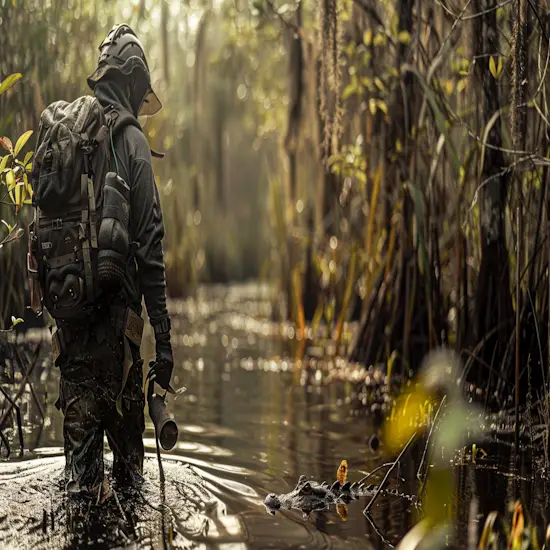
Safety Considerations
When hunting alligators, it’s essential to prioritize safety. Handling alligators requires caution and expertise to avoid accidents. Environmental awareness is also key to guarantee minimal impact on the ecosystem.
Handling Alligators
Approach alligators with caution and always use proper restraints to guarantee your safety. Remember that these creatures can be unpredictable, so it’s important to be prepared at all times.
Approach with Caution
Exercise extreme caution when handling alligators to guarantee your safety and the well-being of these powerful creatures.
- Always approach from the side or behind to avoid direct confrontation.
- Keep a safe distance and never turn your back on an alligator.
- Avoid sudden movements or loud noises that can startle the alligator.
- Don’t attempt to touch or feed the alligator under any circumstances.
Use Proper Restraints
To ensure safety when handling alligators, always use proper restraints to minimize the risk of injury to both yourself and the animal.
Secure the alligator’s jaws with strong tape or rubber bands, ensuring they’re unable to snap or bite. Additionally, properly immobilize the alligator’s body to prevent sudden movements that could lead to accidents.
Environmental Awareness
Now, let’s focus on the importance of environmental awareness during alligator hunting. Keep an eye on changing weather conditions to guarantee your safety and the success of your hunt. Be mindful of wildlife around you and respect their habitat to avoid any unexpected encounters.
Weather Conditions
Paying attention to environmental cues such as sudden changes in wind direction and darkening skies is essential when hunting alligators. Be cautious of weather conditions to guarantee your safety and success in the hunt.
- Check Weather Forecasts: Stay updated on weather patterns.
- Avoid Stormy Weather: Alligators are more active during storms.
- Watch for Lightning: Seek shelter if there’s a risk of lightning.
- Be Prepared: Bring appropriate gear for different weather conditions.
Wildlife Awareness
When hunting alligators, your safety hinges on your awareness of wildlife and the environment around you. Keep an eye out for other dangerous animals that may share the alligator’s habitat, like snakes or large predators.
Be cautious near water bodies as alligators are often found near them. Understanding the ecosystem and potential risks can help you navigate the hunting grounds safely and effectively.
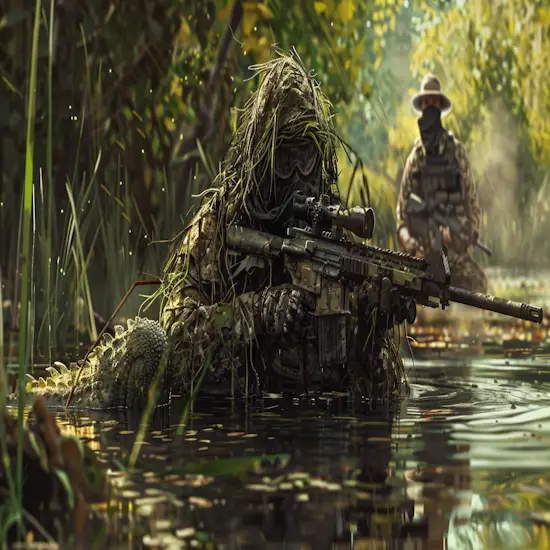
How to Hunt Alligators for Beginners
To begin hunting alligators as a beginner, it’s essential to familiarize yourself with the local regulations and safety guidelines. Alligator hunting can be an exciting but challenging activity, and being well-prepared is vital for a successful hunt.
Here are some essential tips for beginners:
- Training: Consider taking a hunting safety course to learn about firearm handling, hunting techniques, and alligator behavior.
- Equipment: Invest in the right gear such as a sturdy boat, powerful firearm, strong lines, and hooks for a more efficient hunt.
- Scouting: Scout the hunting area beforehand to familiarize yourself with the terrain, potential alligator habitats, and local regulations.
- Safety First: Always prioritize safety by wearing appropriate protective gear, informing someone about your hunting plans, and staying alert during the hunt.
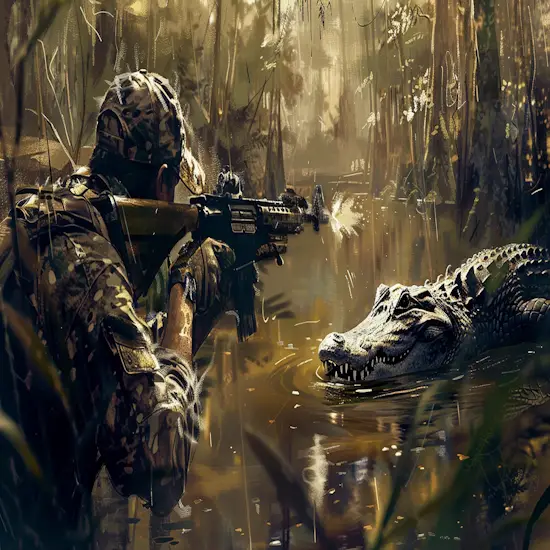
How to Hunt Aligators on Public Land
Consider researching the specific regulations and obtaining the necessary permits before starting your alligator hunting adventure on public land. Each state has its own rules and requirements for hunting alligators on public land, so it’s important to be well-informed.
Once you have all the necessary permits and knowledge of the regulations, it’s time to plan your hunt. When hunting alligators on public land, scouting is key. Familiarize yourself with the area where you plan to hunt, looking for signs of alligator activity such as tracks, slides, and basking spots. Utilize maps and GPS devices to navigate the terrain effectively.
During the hunt, practice patience and remain vigilant. Alligators are elusive and can be challenging to spot. Use appropriate gear such as a strong and reliable firearm or bow, a sturdy boat if hunting in water, and essential safety equipment.
Remember to respect the environment and the wildlife while hunting on public land. Dispose of any waste properly and follow leave-no-trace principles to preserve the natural habitat for future hunts.
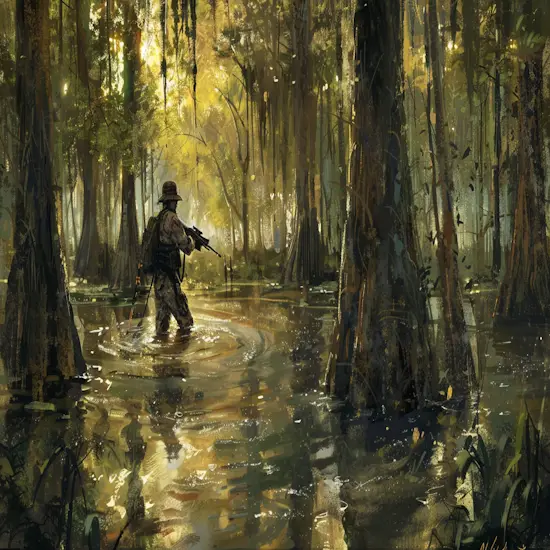
How to Hunt Alligators on Private Land
Before embarking on hunting alligators on private land, make certain to obtain permission from the landowner.
Once you have secured permission, follow these steps for a successful alligator hunt:
- Scout the Area: Familiarize yourself with the land, identify water sources where alligators may reside, and look for signs of alligator activity such as tracks or slides.
- Set Up Proper Equipment: Make sure you have the necessary gear including a strong and reliable firearm, bait, a flashlight for night hunting, and a sturdy boat if hunting in water.
- Hunting Strategy: Choose a strategic hunting spot near water, set up your bait, and wait patiently for the alligator to take the bait before making your move.
- Safety First: Always prioritize safety by keeping a safe distance from the alligator, knowing how to handle the firearm properly, and being aware of your surroundings at all times to avoid any accidents.
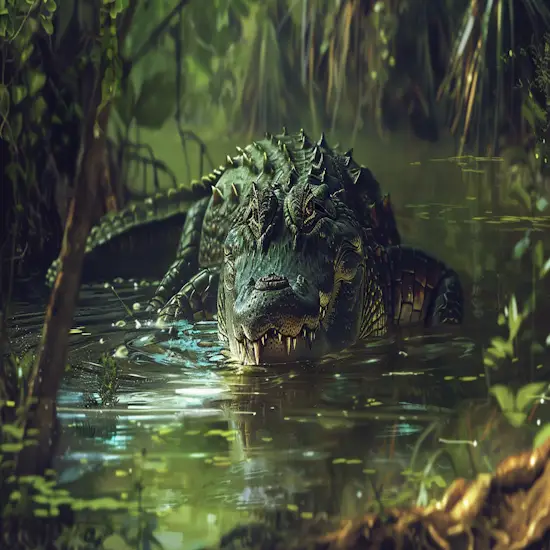
How Do Alligators Hunt Their Prey?
Alligators stalk their prey with stealth and patience, utilizing their keen senses to ambush unsuspecting animals near the water’s edge. These formidable predators rely heavily on their exceptional vision, acute hearing, and sensitive snouts to detect potential meals.
When hunting, alligators often lie in wait just below the surface of the water, with only their eyes and nostrils exposed, remaining perfectly still for extended periods. This tactic allows them to blend seamlessly into their surroundings, becoming nearly invisible to passing prey.
Once an alligator spots a target, it strikes swiftly and powerfully, using its muscular tail to propel itself forward with surprising speed. Their jaws, equipped with rows of sharp teeth, snap shut with tremendous force, securing a firm grip on the prey.
Alligators then drag their catch into the water to drown it, employing a ‘death roll’ technique to subdue struggling victims. This efficient hunting strategy has been honed over millions of years, making alligators one of nature’s most successful apex predators in aquatic environments.
The Bottom Line
Hunting alligators is a rewarding but challenging activity that requires careful planning, knowledge, and adherence to regulations. By understanding alligator behavior, using the right equipment, and employing effective hunting techniques, you can increase your chances of a successful and safe hunt. Always prioritize safety and ethical hunting practices to ensure a responsible and enjoyable experience.
You can also read how to hunt otters, how to hunt beavers, and how to hunt muskrats, if you are interested in hunting other animals.